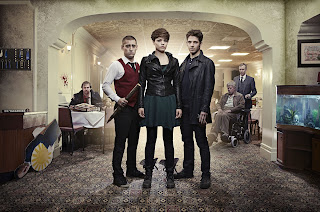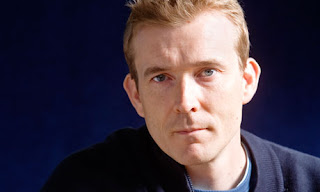How do you follow a hit film, book, album or TV series? Same again or pastures new? Bigger and bolder or smaller and more intimate? Is there anything in the final masterpiece? Simon Fearn has none of the answers.
 |
 |
We can also blame Raimi for more family friendly fluff in the form of the Spiderman Trilogy, so it's not surprising that the thing he's most remembered for is his 80s gore fest. But can we blame him for his move to the mainstream? Would I still be criticising him if he continued in the line of low budget horror flicks? Hence the uneasy conflict between doing what you're good at and being eclectic enough to avoid being accused of being stuck in a rut. We can't all be Danny Boyle or James McAvoy.
Nowhere is it more problematic to find a formula and stick to it than in the music industry. Mumford and Sons were slated by their 2012 epic Babel, with Q Magazine peevishly claiming that it was "just like the last one". But as the band claimed, it was evolution, not revolution. The foursome knew what sort of sound was there's and seemed to be constantly refining. True, Babel is the natural progression from Sigh No More, and none of the tracks are much of a departure for their winning folky formula, but it's a lot better than their debut. Surely that counts for something! The same is true of Florence & the Machine's Ceremonials. More epic pop anthems you say! What did you expect?
 On the other hand, Paramore are almost unrecognisable on their latest single Now and sound like a somewhat annoyed version of Haim. Back in the days of Brand New Eyes, listeners would be slightly taken aback by Hailey William's singing "now-ow-ow-ow-ow-ow-ow-ow", and even now it's slightly annoying. Nevertheless, the band settle in to a comfortable Paramore-esque groove in the pre-chorus, reminding us that the teen-punk-pop angst isn't quite over yet (despite one of the tracks being called I'm Not Angry Anymore, yeah right!). The fact that they're making the bold (or lazy) decision to release a self-titled album seems to suggest that we're finally going to be treated to the true essence of Paramore. But then again, The Beatles's self-titled double album involved strange departures into the Wild West and the confounding Revolution 9.
On the other hand, Paramore are almost unrecognisable on their latest single Now and sound like a somewhat annoyed version of Haim. Back in the days of Brand New Eyes, listeners would be slightly taken aback by Hailey William's singing "now-ow-ow-ow-ow-ow-ow-ow", and even now it's slightly annoying. Nevertheless, the band settle in to a comfortable Paramore-esque groove in the pre-chorus, reminding us that the teen-punk-pop angst isn't quite over yet (despite one of the tracks being called I'm Not Angry Anymore, yeah right!). The fact that they're making the bold (or lazy) decision to release a self-titled album seems to suggest that we're finally going to be treated to the true essence of Paramore. But then again, The Beatles's self-titled double album involved strange departures into the Wild West and the confounding Revolution 9. When making a choice about how to pitch your next project in any of the arts, you need to make one key decision: bigger or smaller? Florence and Mumford both went bigger with superb results. Ellie Goulding laid on the synths in a big way in Halcyon, which while being infinitely more ambitious than the cutesy Lights, seemed to have both drama and subtlety. The cult BBC 3 series Being Human made the unwise (but possibly inevitable) choice of keeping going bigger, culminating in a hugely bizarre situation of the devil taking over the world and our supernatural heroes being stuck in some strange kind of dream world without even knowing about it. Tobey Whitehouse's constant pressure to raise the stakes ever higher meant the series had nowhere to go after its fifth run, and fizzled out just as he'd gone to the trouble of replacing all three of his leads. The truth is, although going bigger sometimes yields great results, its the obvious thing to do. A much braver decision is going smaller.
When making a choice about how to pitch your next project in any of the arts, you need to make one key decision: bigger or smaller? Florence and Mumford both went bigger with superb results. Ellie Goulding laid on the synths in a big way in Halcyon, which while being infinitely more ambitious than the cutesy Lights, seemed to have both drama and subtlety. The cult BBC 3 series Being Human made the unwise (but possibly inevitable) choice of keeping going bigger, culminating in a hugely bizarre situation of the devil taking over the world and our supernatural heroes being stuck in some strange kind of dream world without even knowing about it. Tobey Whitehouse's constant pressure to raise the stakes ever higher meant the series had nowhere to go after its fifth run, and fizzled out just as he'd gone to the trouble of replacing all three of his leads. The truth is, although going bigger sometimes yields great results, its the obvious thing to do. A much braver decision is going smaller. Take David Mitchell, postmodern visionary and general awkward genius. He followed the bonkers Cloud Atlas (which spanned hundreds of years and had a huge ensemble of disparate but interconnected characters) with the intimate Black Swan Green (a semi-autobiographical account of the day-to-day ordeals of a schoolboy stammerer living in the middle of nowhere, spanning just one year). True, when we think of Mitchell, we think Cloud Atlas, but Black Swan Green is perhaps more beautiful. Mitchell wields his characteristic way with words while maintaining the distinctive character of Jason, and make a single year in the life of a schoolboy look just as wondrous as centuries of human history. While I prefer Cloud Atlas, Jason Taylor is my favourite character from the two books.
Take David Mitchell, postmodern visionary and general awkward genius. He followed the bonkers Cloud Atlas (which spanned hundreds of years and had a huge ensemble of disparate but interconnected characters) with the intimate Black Swan Green (a semi-autobiographical account of the day-to-day ordeals of a schoolboy stammerer living in the middle of nowhere, spanning just one year). True, when we think of Mitchell, we think Cloud Atlas, but Black Swan Green is perhaps more beautiful. Mitchell wields his characteristic way with words while maintaining the distinctive character of Jason, and make a single year in the life of a schoolboy look just as wondrous as centuries of human history. While I prefer Cloud Atlas, Jason Taylor is my favourite character from the two books.With all this to think about, it's no surprise there's so many one-hit-wonders. Where was Richard Kelly meant to go after he stunned the world with Donnie Darko? If George Orwell had managed another book, how would he follow Nineteen Eighty-Four? It seems there's something in final masterpieces. If you have these big moments early in your career, then the rest of it is going to consist of you constantly weilding out the old behemoths while your latest, possibly more rewarding work, becomes a mere footnote. No wonder Radiohead got sick of Creep, with Tom Yorke wailing "this is our new song, just like the last one, a total waste of time" in My Iron Lung. The wait of history arguably turns the old visionaries like Sam Raimi into Hollywood's yes-men. Even Tim Burton suffers, not only was Planet of the Apes terrible, but so was Charlie and the Chocolate Factory and Alice in Wonderland, with Burton making the curious decision of trying to appeal to nine-year-olds. None of his recent works can live up to Edward Scissorhands or Big Fish, two films which seemed to capture the essence of Burton.
Danny Boyle seems not to have any of these worries, avoiding the woes of the disappointing follow up by making his films distant cousins rather than successors. But most mere mortals in the artistic world will always be pursued by their own back catalogue. The Raimis and Burtons of this world will hide in the big money and big audiences of Hollywood, the Paramores will stoically refuse to grow up and the Mumfords will develop at the pace of a snail playing a banjo. And so our artists heroically continue along the road to certain obscurity, but are capable of minor miracles along the way.
Ratings of films/books/albums/TV series mentioned:
Oz: The Great and Powerful- 3/10
Mumford and Sons: Sigh No More- 7/10
Mumford and Sons: Babel- 8/10
Paramore: Now (Single)- 6/10
Being Human: Series 5- 7/10
David Mitchell:Cloud Atlas- 9/10
David Mitchell: Black Swan Green- 8/10
Planet of the Apes (Tim Burton Remake)- 4/10
Big Fish- 8/10


No comments:
Post a Comment